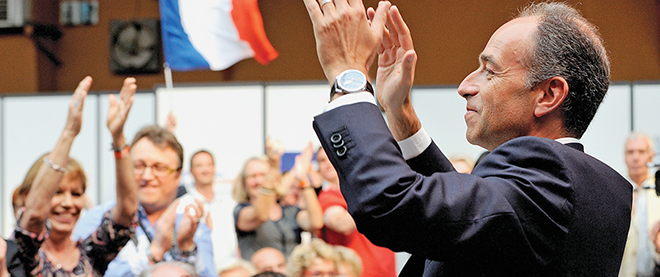Jean-François Copé: France’s would-be president
What Copé learned in Ottawa about winning elections
Philippe Huguen/AFP/Getty Images
Share

This should be the best possible time to lead an opposition party in France, because it is a very hard time for the government. The country’s Socialist president, François Hollande, has fallen steadily in public opinion. In December, only 19 months after he was elected, Hollande became the most unpopular president of the Fifth Republic, with only 24 per cent of respondents expressing confidence in him to govern, one point lower than even Jacques Chirac, the leader France once loved to hate.
But Jean-François Copé, the president of France’s centre-right Union for a Popular Movement (UMP) party, was hardly full of bravado when he sat down with Maclean’s for an interview during a recent visit to Ottawa. Theoretically, Copé, a studiously charming 49-year-old technocrat, could be the next president of France. His predecessor as UMP president, Nicolas Sarkozy, used the post as a springboard to become president in 2007. That turned out not to be the beginning of a lucky streak. Sarkozy lost his re-election bid in 2012. Copé ran against Sarkozy’s hand-picked prime minister, François Fillon, for the UMP presidency. Copé won, Fillon contested the result, and the rift the two men opened in the party still hasn’t healed.
One poll in November showed that even among declared UMP supporters, Copé is now the preferred candidate of only one per cent. Fully 60 per cent of supporters hope Sarkozy will come back to be the party’s standard-bearer. Loyalty to the man who lost the last election is the main ingredient cramping the style of anyone who hopes to lead his party into the next one.
Perhaps understandably, Copé was in no mood to speculate about the next presidential election, in 2017. “It’s an eternity, three years,” he says. He summoned a note of optimism: “Jacques Chirac used to tell me, ‘Don’t listen to the polls.’ ” Then he expressed a determination to concentrate on matters closer at hand. At the end of March, French voters will elect town councils in nearly 37,000 local elections fought along the same party lines as national elections. It will be the first chance they’ve had to cast votes since they elected Hollande president. “2014 will be a crucial year, for the UMP and for France,” Copé says. “I often say that the UMP will not win 2017 if it doesn’t win 2014.”
His evolving game plan for the municipal elections actually resembles the one that worked in 2006 for his main interlocutors on this visit, the Conservative Party of Canada. (In a two-day visit, Copé had a packed schedule that included visits with Prime Minister Stephen Harper, NDP Leader Thomas Mulcair and a pack of cabinet ministers, including Jason Kenney.) “What do voters tell us when we talk to them?” Copé said. “There are things you said you’d do that you didn’t do.” Indeed, the overriding voter sentiment in France, regardless of governments’ party stripe, is disappointment that the system seems beyond reform.
Hence Copé’s plan. “I’m proposing we agree with the French people that we don’t necessarily need 100 reforms, but five. And not to do them in five years, but in the first six months.” Five priorities? Just like the Harper Conservatives? “All I know is that they are still in power,” Copé said, smiling. He wants to entrench a “pact with the French people,” approximately five items in length, at the next UMP national council meeting at the end of January. Its items would include a more flexible workweek, lower taxes, the promotion of an economic class of immigration and red-tape reduction. Short deadlines would, in theory, ensure quick action.
For Copé, as for so many of his predecessors, Canada is a kind of model. “France must now do the work that Canada did 20-odd years ago,” he said. It’s easy enough to say in opposition, harder to implement in power. Ever since former Liberal finance minister Paul Martin balanced the federal budget in the late 1990s, a succession of French governments has airlifted bureaucrats to Paris to seek Canada’s secret.
And, as always, there’s the far-right National Front, riding high in recent polls as France continues to worry about joblessness and immigration, to complicate the mainstream parties’ electoral calculus. Who will lead France next is very much an open question; another is whether any of the contenders has answers that can shake the country out of its extended funk.